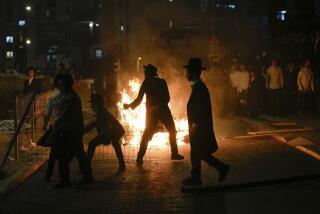In Jordan, Palestinians Fear Attacks on Camps : Refugees: They gather for a ‘civil defense’ meeting. Their primary concern is preparation for the war they expect in their own back yard.
BAQAA CAMP, Jordan — A few hundred demonstrators Tuesday waved Palestinian flags bordered in black as they loudly blamed Israel for the murder of Palestinian leader Abu Iyad. But, throughout this huge, 23-year-old camp for 100,000 Palestinian refugees, the mourning and anger were overshadowed by fears for the future.
As the U.N. deadline neared for Iraq to withdraw from Kuwait, the camp’s doctors, engineers and “military” leaders gathered in an unfinished sports stadium they call The Club to prepare for war--not the one in Iraq, but the one they expect in their own back yard.
“It’s not our problem if America invades Iraq,” said one of the dozens of camp professionals at the meeting, which drew almost as many participants as the Abu Iyad protest rally staged inside the camp earlier in the day.
“Our problem comes when Israel invades Jordan and attacks our camps. We have to prepare for this.”
A young Palestinian doctor interrupted. “In my part of the camp, there are 2,000 people living with no shelter. If there’s an air attack, what should we do?”
Such fears are understandable among the residents of Baqaa Camp, and, indeed, among most of the nearly 2 million other Palestinians living in Jordan. Most fled the Israeli-occupied West Bank after the 1967 war drove them from their native villages and towns. Most are loyal followers of Palestine Liberation Organization Chairman Yasser Arafat. They universally blame Israel, rather than a rival Palestinian faction being blamed by PLO officials, for the gangland-style killings Monday night in Tunisia of Abu Iyad, the PLO’s No. 2 man and its counterintelligence chief, and two other PLO aides.
But the dread and desperation at the camp’s “civil defense” meeting Tuesday night went far beyond reflexive caution and suspicion, underscoring the far-reaching implications of the looming gulf war.
The Palestinians in Jordanian camps are convinced that if a war starts, Iraq will attack Israel and that Israel will retaliate. Jordan lies between those two countries, putting the Palestinian camps in the way of cross-fire. They believe that Israel will take the opportunity to bomb its Palestinian adversaries.
“With the increased probability of war and the increase in Israel’s military levels on the border, Israel is now threatening to invade parts of Jordan and take advantage of the gulf crisis . . . to end the intifada (Palestinian uprising),” declared an open letter widely distributed Tuesday evening in the Palestinian camps here, all of which are centers for the Palestinian uprising in the West Bank.
The letter called on all Palestinians to arm themselves and to organize vigilante “defense teams” within the camps.
The camp meeting was told that a formal appeal is being made to the Jordanian government to establish weapons centers and distribute arms to the Palestinian refugees as added protection.
The request almost certainly will be rejected. Still fresh in the minds of all Jordanians is the memory of Black September in 1970, when Arafat’s followers assassinated Jordan’s prime minister and used their bases within the camps to stage a guerrilla war aimed at overthrowing Jordan’s King Hussein and taking over the country.
The king ultimately drove Arafat and the leaders of the other armed Palestinian factions out of Jordan and into Lebanon. Since then, King Hussein has maintained a delicate coexistence with the camps, where the Jordanian government has built schools and other basic infrastructure.
But analysts said the fact that the Palestinian refugees would now ask Jordan for arms and ammunition illustrates the depth of their concern for the immediate future.
“There is no time left to organize new committees or study the problem,” a doctor said at the Tuesday meeting. ‘We have to act right now or panic will sweep through the camp.”
More to Read
Sign up for Essential California
The most important California stories and recommendations in your inbox every morning.
You may occasionally receive promotional content from the Los Angeles Times.










